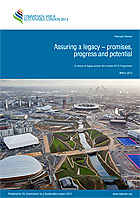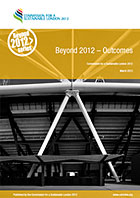
The Commission for a Sustainable London 2012 today publishes a review of the Games’ legacy commitments entitled Assuring a Legacy – Promises, Progress and Potential. As the independent body providing assurance on the social, economic and environmental sustainability of the Games, the Commission’s legacy review investigates whether the organising bodies are delivering the legacy commitments, and makes recommendations where these commitments are in danger of being compromised. In addition, the review highlights new opportunities for legacy achievements in East London.
The Commission’s review focuses attention on the opportunity to deliver a sustainable legacy for East London, a region where employment, life chances, urban quality and amenities do not match up with the London average. The Commission has also considered how these opportunities could more widely benefit the UK as a whole.
A summary of the review’s main findings is below:
- London 2012 is on track to have a social, environmental and economic legacy that is second-to-none, despite challenging economic times. London has gone further and farther than any other Games in achieving a sustainable legacy.
- Challenges remain, particularly in relation to healthy living and waste infrastructure. There is a danger that the achievement of legacy objectives may drift off-course if care is not taken to make sure they remain responsive, strategic and targeted.
- Opportunities to extend the legacy commitments must be seized, not missed. The evidence is beginning to show that it is possible to deliver above expectation in some areas. For example, the Commission has identified the potential to extend the approach to physical regeneration of the Park and lower Lea to cover the whole river valley. Opportunities like this could significantly benefit the green economy, healthy living and biodiversity, and would provide a blueprint for future large-scale projects.
- The Olympic Park’s future is still highly dependent upon the quality and commitment of the legacy agency. The Commission would like the OPLC/LLDC to build on its good work by demonstrating publicly how it is embedding, resourcing and reporting on environmental and socio-economic sustainability throughout its core business by the end of April 2012.
- The Commission recommends that the GLA and national government embed the lessons for sustainable procurement into the way they do business at London and national levels. This will ensure that the benefits of the Games are felt beyond East London.
- LOCOG’s sizeable contribution to improving the sustainable events industry should be made widely available beyond the Games. This legacy of best practice examples and lessons learned would be an invaluable resource for UK industries.
The Commission’s legacy review is the first that the Commission has dedicated solely to the question of the Games’ legacy.
Full list of recommendations:
- That key East London organisations including LVRPA, OPLC, Host Boroughs, Westfield, Triathlon Homes, Natural England, British Waterways, the Environment Agency, and third sector bodies come together to formulate a community of practice and a critical path for meeting wider legacy aspirations and initiatives and to ensure these remain on-task, coordinated and deliver optimum benefit.
- That a key priority for the community of interest group (Recommendation 1) is to commission the development of a future-proofing strategy for the entire Lea Valley, that actively identifies and removes road-blocks to the whole river-valley becoming a single sustainable urban, green infrastructure system with enhanced economic, social and environmental outcomes and amenity. The development of the strategy should be undertaken by an appropriate agency or partnership on behalf of the coordination group and should take account of the convergence agenda.
- That OPLC/LLDC builds on its good work by demonstrating publicly how it is embedding, resourcing and reporting on environmental and socio-economic sustainability throughout its core business by the end of April 2012.
- That LOCOG, with appropriate support from Government, creates its own learning legacy that can be shared publicly beyond the IOC family to the events industry more broadly so as to optimise the public and private sector investment in the 2012 Games and its impact on major events in the UK and worldwide.
- That the GOE publicly detail how its 2012 programmes, initiatives and funding will be managed into legacy, prior to the commencement of the Games period.
- That the Government make fully transparent how it is meeting its commitment to improve sports participation across its range of funded programmes (and how resources and programmes structures have been realigned to achieve this).
- That Government, through appropriate interdepartmental mechanisms, agree a way to ensure that sustainable procurement principles and mechanisms are considered as part of Government buying guidance and other relevant frameworks.
- That the GLA develop an internal process and identify a suitable resource to collate, synthesise and implement lessons learnt from the 2012 Programme to ensure that the Group continues to lead in sustainable procurement, waste policy, food policy and other relevant functions.
- The GLA put in place mechanisms to consider whether a potential future model for strategic sustainability assurance could be of benefit for London, potentially with regard to major projects.
